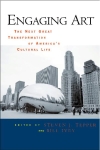« A paradigm shift? | Main | Facing the Music »
June 20, 2007
FInal thoughts
by Robert LevineIt's not very satisfying to end my postings here with a cry or three of frustration, but honesty has a satisfaction all its own.
My first frustration is my continuing lack of understanding of why audiences come to concerts. I suspect this is a problem that hampers a number of participants in the orchestra business who are responsible for... getting people to come to concerts. That's not a criticism; simply an observation that those attracted to work in the industry generally have a connection with the art form that is atypically deep and which does not fully equip them to understand those whose connection is less so.
My second head-against-wall issue is that of musician "involvement" in performances. Something Greg wrote encapsulates it perfectly.
... The field is endangered. You're playing great art, which you're committed to. And there's an audience out there! In what other kind of performance do people routinely not do their best, and then blame someone else for it? (In this case, the conductors.)
The mystery at the heart of orchestral performance is the interaction between conductor and orchestra. I've been doing this for a long time and I still don't really understand it.
But I know this much. Orchestras are ensembles, composed of able and committed musicians who are trained from a very early age to play together, play in tune, and make a beautiful sound. By the time one wins a place in a professional orchestra, these things are as reflexive as breathing.
But orchestras are also instruments, and like instruments, they don't play themselves. When a Strad is played out of tune, it's not the Strad's fault. It didn't much matter what kind of violin Heifetz played, except perhaps to Heifetz. It's impossible for an orchestra to play at its best for a bad conductor. It's just impossible. And it's almost as hard not to play well for a really good conductor. It's not about musicians "not doing their best." That's a concept that needs to be purged from this discussion if it is to include musicians - and it needs to include musicians.
I get as frustrated when I see people blaming orchestras for bad conductors as I do when I see my colleagues not understanding that enjoying one's job is both something that not only requires thought and effort on their part, but is actually part of doing one's job in this business.
My final frustration is exemplified by something that Ed Cambron wrote:
I will never forget a speech I heard several years ago given by Gary Graffman at Curtis. He basically said that the problem with orchestras started in the 60s when they became big businesses, adding development, marketing, and other functions, thus creating a need for more and more audiences and support which weren't naturally present in the community. I've always been bothered by what he said, because in my opinion these developments were a response to growing orchestra musician contract costs requiring 52 weeks of employment, expanded benefits, etc. We became supply driven and fundraising bailed us out.
A more succinct way of stating this would be that the problems with orchestras started when musicians were able to effectively demand that they be paid a living wage. But even that's not true. Orchestras have never been for-profit enterprises. They have always, and everywhere, needed and received external support; be it from royalty, the nobility, the government, foundations, rich people, lotteries, or their own musicians.
The need for external support is not, in software terms, a bug; it's a feature. And it's not a new feature. The real questions we need to answer are whether or not our industry deserves that support and if it will continue to do so.
Posted by rlevine at June 20, 2007 3:34 PM
COMMENTS
Post a comment
Tell A Friend
Resources
Engaging Art: The Next Great Transformation of America's Cultural Life Chapter downloads MP3s Vanessa Bertozzi on audiences and participation Vanessa Bertozzi on involving artists in work Steven Tepper argues the historical context of arts in America
Abstracts
Chapter 4
In & Out of the Dark - (a theory about audience behavior from Sophocles to spoken word)
Chapter 7
Artistic Expression in the age of Participatory Culture (How and Why Young People Create)
Chapter 8
Music, Mavens & Technology
(all chapters in pdf form)
Steven Tepper talks about technology and the future of cultural choice
Lynne Conner on the historical relationship between artist and audience
Lynne Conner on event and meaning and sports
AJ Blogs
AJBlogCentral | rss
culture
Terry Teachout on the arts in New York City
Andrew Taylor on the business of arts & culture
rock culture approximately
Rebuilding Gulf Culture after Katrina
Douglas McLennan's blog
Art from the American Outback
Scott McLemee on books, ideas & trash-culture ephemera
Jan Herman - arts, media & culture with 'tude
dance
Apollinaire Scherr talks about dance
Tobi Tobias on dance et al...
media
Jeff Weinstein's Cultural Mixology
Martha Bayles on Film...
music
Greg Sandow performs a book-in-progress
Howard Mandel's freelance Urban Improvisation
Focus on New Orleans. Jazz and Other Sounds
Exploring Orchestras w/ Henry Fogel
Kyle Gann on music after the fact
Doug Ramsey on Jazz and other matters...
Greg Sandow on the future of Classical Music
Norman Lebrecht on Shifting Sound Worlds
publishing
Jerome Weeks on Books
visual
Public Art, Public Space
John Perreault's art diary
Lee Rosenbaum's Cultural Commentary
Tyler Green's modern & contemporary art blog
Special AJ Blogs
June 14-20, 2007



